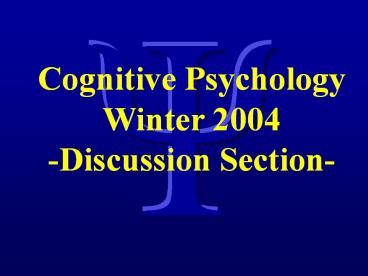PowerPoint-Pr - PowerPoint PPT Presentation
Title:
PowerPoint-Pr
Description:
... abstractions, the mental representation is a feature-list ... Psychology of Meditation -Buddhist Psychology -Eastern Religions, Embodiment -Williams Syndrome ... – PowerPoint PPT presentation
Number of Views:32
Avg rating:3.0/5.0
Title: PowerPoint-Pr
1
?
Cognitive Psychology Winter 2004 -Discussion
Section-
2
Categorization
3
Cognitive functions
- Perception
- Attention
Emotion Motivation Action
- Memory
- Imagery
Categorization
- Decision-making
- Reasoning, problem-solving
- Language
4
Overview
- Categorization as a key to cognitive functioning
- Theories
- Rosch
- Exam review
5
Life without categories?
6
? Categories have tremendous utility for
organisms.
? Categories make cognition efficient, language
possible.
? Mistakes in Categorization have serious
consequences.
7
The concept of a category
8
More realistically...
9
And now?
10
Implications
- Huge implications for stereotypes, prejudice
11
Theories of categorization
- Classical view
- Dominant until 70s.
- Derived from formal logic
- All instances of a concept share features that
are individually necessary and collectively
sufficient.
- Implications
- Concepts are abstractions, the mental
representation is a feature-list - Category-membership is unambiguous and binary.
- All features are equally important, carry equal
weight.
12
Theories of categorization
- Prototype view
- In opposition to classical view.
- Promoted by Rosch (in particular)
- A concept has a number of characteristic
features. The more of these a particular instance
exhibits, the more typical it is.
- Implications
- Concepts are abstractions, the mental
representation is an idealization - Category-membership is ambiguous. Core fuzzy
boundaries. - Not all features are equally characteristic and
not every instance of a category has to exhibit
all of them in order to be a member.
13
Theories of categorization
- Exemplar view
- In opposition to both other views.
- Concepts include representations of at least some
actual instances of the concept. - Categorization occurs by comparing new instances
to stored instances.
- Implications
- Concepts are not abstractions - the mental
representation is an accumulation of actual
instances of the concept. - Category-membership is ambiguous. Core fuzzy
boundaries.
14
Theories of categorization
- Schemata/Script-view
- Concepts are Schemata and Scripts
- Their hierarchical configuration allows different
levels of abstraction. - Explains prejudice/assumptions (default values)
- Knowledge-based view
- Concepts and instances are like theory and data.
- We use our knowledge about essences and semantic
relations to classify things.
Problem with both views Not empirically testable
at this point
15
Overall
- Similarity based theories
- Classical view
- Prototype view
- Exemplar view
- Explanation based theories
- Schemata/script view
- Knowledge based view
Problem with similarity Hard to quantify if
there are more than a few features.
Problem with explanation Very hard to study.
16
To summarize
- None of the theories can explain all of the
empirical evidence.
- Every individual theory has empirical or
conceptual problems.
- They are not necessarily mutually exclusive. It
would make sense if the truth contains part of
all the theories.
- Brain-view
- Brain utilizes whichever dimension has the
largest variance and predicts events best to
categorize. - It is flexible, can change the dimension
dynamically by attention. - Concept is represented in a fuzzy network.
Learning by experience what is relevant.
17
Rosch Mervis
- Then
- Typicality effects in categorization
Rosch
Mervis
Louisville
Berkeley
Now
-Psychology of Meditation -Buddhist
Psychology -Eastern Religions, Embodiment
-Williams Syndrome -Genetic Neuropsychology
18
A word on QALMRIs
Congrats!
Homework Compare the latest 2 QALMRIs with the
first two.
Natural reaction Being thrilled and disgusted at
the same time.
Extra credit Compare them with those from people
in other sections.
19
The exam...
Form No comment...
20
Problematic concepts
Implicit memory vs. explicit memory
- Main differenceExplicit memory is verbal, can
be verbalized. - Implicit memory is nonverbal, cannot be verbalized
- To noteStrictly speaking, implicit or
explicit are ways to probe memory, not
necessarily properties of the system itself! - Even if, the systems are not symmetric. Semantic
memory is NOT implicit.
21
Problematic concepts
Serial position effects
Primacy and Recency effect in recalling lists
Usage Evidence for difference between STM and LTM
Primacy LTM
Recency STM
22
Problematic concepts
Declarative memory
NOT a memory for specific events.
Conceptually, its everything in memory that can
be verbalized. A super-category including both
episodic and semantic memory. It is EXPLICIT.
23
Problematic concepts
Procedural memory
NOT memory for routine activities like restaurant
visits. Confusion with Scripts.
Procedural memory cannot be verbalized!
It contains information about actions and their
sequences. Know how (to)
24
The results
25
The results
Last time
This time






























